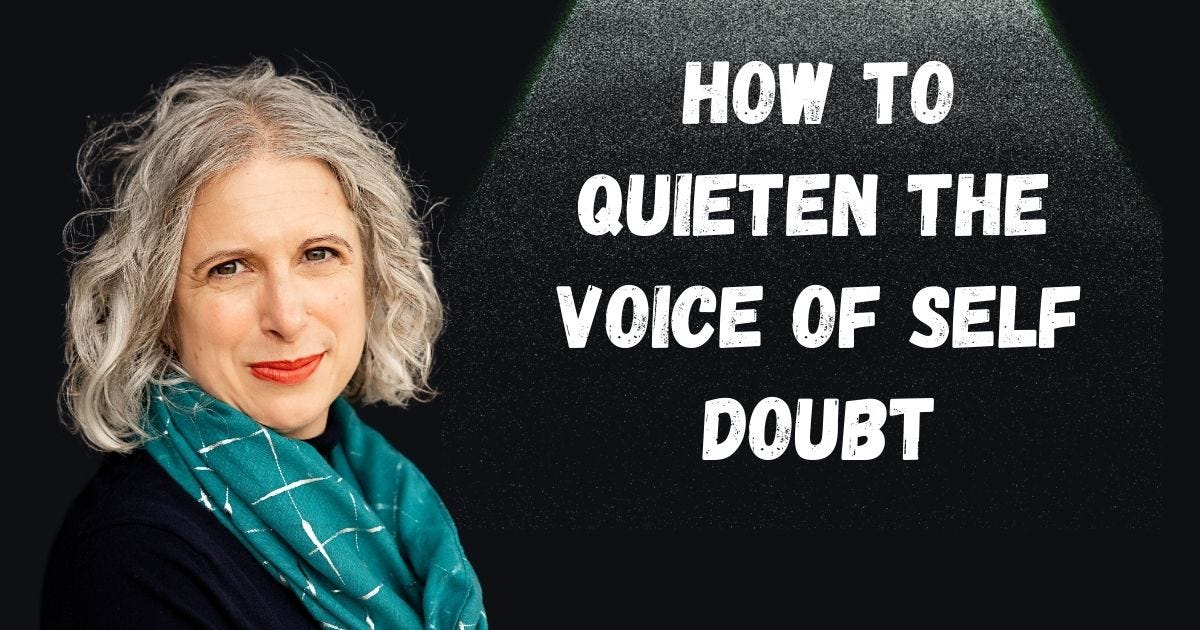Welcome to a free edition of Start Up To Grown Up: Your source for ideas, insights and tactics to take back control of your business and scale it sustainably and profitably by Heather Townsend, award-winning author of The Accountants’ Millionaires’ Club and Founder of The Accountants’ Growth Club
We’d just finished an all-team meeting. Everyone popped up on Google Meet, so many faces that we actually ran out of slots on the screen. I sat there and just thought, "whoa, I’ve got a little, big train set here".
For the rest of the day, I was buoyant. The business was growing nicely, and it all felt good.
And then, later that evening, the small voice of doubt set in.
It’s corrosive, isn’t it?. One minute you feel on top of the world; the next, you're questioning if you have what it takes. If this sounds familiar, I want you to know you’re not alone.
I’ve been battling it ever since I became a business owner, but it has become particularly intense in the last five years. The small voice of doubt has become very vocal as I’ve grown the firm and constantly pushed myself out of my comfort zone. Then the delights of perimenopause and some dalliances with nutritional deficiencies have made anxiety my constant companion. Anxiety seems to amplify the small voice of doubt so much that it feels like someone has put some petrol on the fire that can be my mental state. And not in a good way.
That voice is a normal part of the journey to grow and scale your firm. It’s an uncomfortable voice. Indeed, it’s caused untold damage to my goal of growing my firm. We often try to run away or silence this voice. But meditation and mindfulness will only go so far to quieten down this voice. The goal isn’t to silence it forever, but to understand where it comes from and learn how to manage it.
In this article, I’m going to share my battle scars and my top tips on how you can learn to make the small voice of doubt your friend in the journey to take your business from start-up to grown-up.
Why growing and scaling a small business is so hard in the first place
That inner critic thrives on the challenges that are baked into growing a business. It’s hard work, and the ground is constantly shifting underneath you. To start with, your role is always changing. Back in 2013, all I needed to do was win enough business to support myself and one employee. If there was a £10,000 gap in the cash flow, I knew I could quickly go and find it. Now, it’s not like that at all. I have to limit the amount of new business I personally win deliberately. For a business owner nearing a half-million-pound turnover, your role is no longer just about winning and servicing work; it's about managing forecasts versus capacity, building a great team, and leading them effectively. Many of us don’t realise when these priorities change, and that’s why it feels so hard.
On top of that, you have to learn new skills all the time. Nobody teaches you this stuff. I had to learn how to have difficult conversations, even though I left corporate life specifically to avoid them. And while you can get training, there is no substitute for the hard-won practical experience. You often have to go through an acrimonious exit with a staff member to truly learn the importance of getting the people stuff right.
Your talents also play a huge part. You’re good at some things and not so good at others. I’m the classic "entrepreneurial squirrel". I'm great at the big picture, seeing how we can make one plus one equal five. But the detail? The admin? I’m not great at that. Until you have people around you that you’ve developed, you have to do everything. This constant pressure creates the perfect breeding ground for self-doubt.
What causes the inner voice of doubt?
So what's really going on in your head? It’s not a personal failing; it’s your brain trying to keep you safe. There's a small part of your brain called the amygdala, and it evolved to protect us from sabre-toothed tigers. Its job is to scan for danger. The problem is that it equates the fear, uncertainty, and doubt that come with running a business with the same level of threat as a predator hiding behind a tree.
As a business owner, you are always being pushed out of your comfort zone. You live in a state of uncertainty and doubt. You’re constantly facing new situations, wondering, "Can we do this?" or "What happens if I try this?". Because of this, it’s not surprising that your amygdala is often permanently switched on, ringing loudly in your ears. That’s when the little voice on your shoulder starts up, bringing with it fear and anxiety.
How to manage the voice you can't ignore
Here’s the thing you need to understand. You can’t just shut the voice up. In fact, trying to fight it or ignore it just makes you more emotionally involved, the voice gets louder, and the vicious cycle continues.
A cognitive psychologist described these intrusive thoughts as ‘NATs’ - Negative Automatic Thoughts. They are pesky, unwanted, and unhelpful, yet we all have them. They can present themselves in a few common ways:
Black-and-white thinking: "If I don't do well in every area of my business, I'm hopeless".
Catastrophising: "If I don't get some new business wins soon, my business will fall apart and fail".
Perfectionism: "I've had a busy week and allowed my paperwork to pile up; now I'm out of control". (No one, please look at the state of the filing on my kitchen worktop!)
The difference between being controlled by these thoughts and managing them is your ability to challenge them. The first step is to identify if they are rational or irrational. Then, you can flip the mindset. Thank the voice for alerting you to something important. For example: "Thank you for alerting me to my paperwork," or "Thank you for reminding me that we need to put a push on business development". Suddenly, the thought is no longer a catastrophe; it’s the nudge you need to nip a problem in the bud.
Practical ways to quieten the small voice
Managing your mindset is an active process. It’s not about finding a single magic bullet. There will be times when you are strong and resilient and hardly affected by the small voice of doubt. Then there will be other times, often when you are battling stuff on a few fronts, where it appears that everything you try doesn’t calm down that corrosive voice on your shoulder.
Given this, the key is to build a toolkit of strategies and habits you can turn to when that voice gets too loud. For me, it starts with the non-negotiables: the four foundational habits of self-care. It’s about exercise, sleep, nutrition, and recharge time. When you’re stressed, your brain floods your body with hormones like adrenaline and cortisol. The best way to get rid of them is to do the ‘fight or flight’ your body is primed for. Exercise burns off that excess cortisol, telling your brain that you've escaped the tiger and everything is fine. Likewise, getting good quality sleep is essential. It helps you cope with stress and think rationally because your brain is literally flushing itself of toxins while you rest, including a hormone called adenosine, which makes you feel tired. The more tired you are, the harder it is to have a rational response to the day's challenges.
Beyond these foundations, it’s about proactively building habits that support your mental state. Our brains love habits because they are energy-efficient. They work on a simple loop: a trigger, an action, and a reward. The more you obey a trigger and get the reward, the stronger that neural pathway becomes. For me, I’ve built a strong habit around morning exercise. When I wake up, my brain craves the reward it knows it will get. Whether I go for a walk or sit on my water rower, I know I will feel better afterwards. This is a conscious choice to manage my state.
Journaling is another powerful tool. It gets the worries and anxieties out of my subconscious and onto paper, which really helps me to figure out what’s a real problem and what’s just an irrational fear. When I journal, I even give myself marks out of 10 for key things like my anxiety levels, which helps me track patterns. Meditation also makes a huge difference. If I feel myself getting ratty and scrolling on social media, I know that’s an unhelpful habit. Stopping for 15-20 minutes to meditate can completely quieten that inner noise and reset my mood.
Finally, it’s about consciously shifting your mindset when you’re in a negative loop. A simple but effective model is to ask yourself one question when the doubt creeps in: "Is this helping or hindering me?". (I learnt this technique after spending time with Go MAD thinking)
I remember once I was driving home for an hour and a half in the dark, pouring rain, which is something I really don’t like. My mind was full of "I don't like this," so I asked myself, "Is this helping or hindering?" It was hindering. What would help? Focusing on the road. It’s a simple way to change the dialogue in your head.
It’s also vital to look back and note how far you’ve come. We so often forget our progress. I was with a member of The Accountants’ Growth Club recently who was almost apologising for the state of his business, and I had to remind him that just two years ago, he couldn’t have taken a holiday without his firm falling apart. He’d just had three big holidays. Gaining a sense of perspective is a great way to quieten the voice of self-doubt. It could be what you need to get the confidence to keep going..
Final thoughts
That small voice of doubt is just your brain trying to do its job. It may feel like a bug, but it’s actually a helpful feature when you listen to it without judgment. In many ways, it’s a sign you’re pushing yourself and stepping into the unknown, which is exactly what taking your business from start-up to grown-up requires.
You can't eliminate it, but you can make friends with it. Listen to what it's really telling you, analyse what you need to listen to, and then you get to choose what to do next.
Your actions this week
Take some time to reflect on what has gone well in your business recently.
When that voice of doubt pipes up, don't fight it and choose to become friends with the voice.. Just ask yourself what you can learn from it.


















Share this post